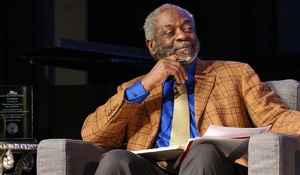Les Payne. Photo. SUNY Oswego-Flickr
[From The archives]
Originally published in Northeast Magazine, 1986
For a young black student fresh from “separate but equal” Alabama in 1954, the stately and old Hartford Public High School with its red-brick towers, all-white staff and predominantly white student population was an intimidating place. But ninth-grader Les Payne earned straight A’s and the following fall sat down with his curriculum counselor to plan that year’s course of study.
“So, Les, what would you like to be?”
“An engineer.”
“I don’t think you should be an engineer, Les.”
This snippet of dialogue from a long-running American tragedy is one of Les Payne’s most vivid memories of Hartford. “He said as a black person I should concentrate on an area [of study] where I could get a job. I remember that as clearly as if he told it to me yesterday … I thought it odd.”
It seems odder still today, three decades later. The walls of Payne’s high-ceilinged office at Newsday are decked with testimonials to his professional accomplishments. In one picture, he is shaking hands with President Jimmy Carter. A 1981 proclamation from the Connecticut General Assembly is hung so high that the small print is out of range. Beneath it, awards for his reporting and punditry are arrayed as thickly as house shingles.
One frame encases a younger, leaner Payne featured in a “Dewar’s Profile” advertisement and under “Latest Achievement” is listed: “Winner of 1974 Pulitzer Prize for Public Service Reporting.” It is an accolade he nearly captured again a few years later, only to have the Pulitzer Advisory Board overturn his selection by the jury. Amid the glib, upbeat ad copy is this eye-opener: Most Memorable Book: Wretched of the Earth.
Although he has left the Scylla and Charybdis of poverty and racism largely in his wake, Payne is keenly aware that his successful odyssey is unusual among black men and women of his generation. “I survived it, but my survival is not typical; most black men don’t survive it. A good deal of a successful black man’s friends are in prison not because they are criminal types, but because that is the way society is set.”
Payne’s career in journalism has been all about setting society straight, particularly the predominantly white and insular enclave served by the Long Island daily newspaper Newsday, where he has worked since 1969.
In 1981, he was promoted from national correspondent to national editor. Today, he is assistant managing editor for foreign and national news, supervising 26 reporters, six editors and 11 news bureaus around the world. But he is best known for his weekly column, which he began writing five years ago and which went into syndication in in April.
His 850-word harangues are frontal assaults on “some very dearly held assumption of a lot of readers,” says Ilene Barth, editor of the paper’s Viewpoints section. They have inspired bushels of hate mail and death threats. The Village Voice reported that Payne’s photograph has appeared on “at least one police pistol target range” on Long Island. In his columns he frequently fires salvos at New York City Mayor Ed Koch, and after particularly spirited pieces attacking people as diverse as George Wallace and Bernhard Goetz and Long Island real estate agents, Newsday has felt obligated to screen Payne’s mail for bombs.
For more please see DavidHolahan.com
[The Black Star News occasionally publishes or links to articles that are timeless about inspirational individuals — Les Payne is one such person ]
Updated with link to a tribute to Les Payne’s following his death.
http://www.blackstarnews.com/us-politics/news/les-payne-my-brother-intellectual-reporter-loved-the-roots-of-his





